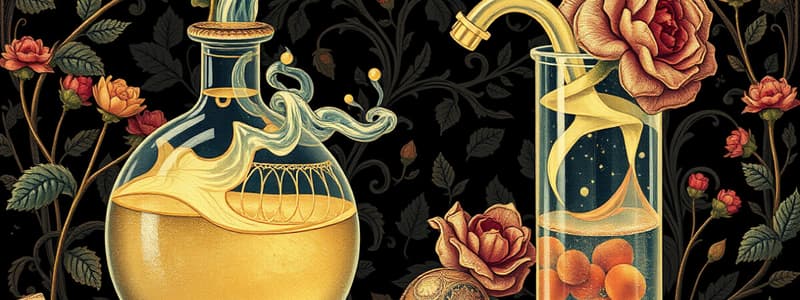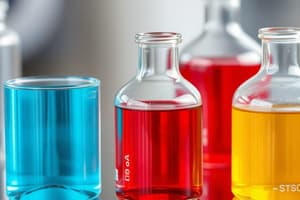Podcast
Questions and Answers
What is matter?
What is matter?
- Only gases
- Anything that has mass and occupies space (correct)
- Only solids and liquids
- A type of chemical
Pure substances can be broken down into simpler substances by physical processes.
Pure substances can be broken down into simpler substances by physical processes.
False (B)
What are the three states of matter?
What are the three states of matter?
Solid, liquid, gas
Which of the following is an example of a chemical change?
Which of the following is an example of a chemical change?
What characterizes a compound?
What characterizes a compound?
Give an example of a pure substance.
Give an example of a pure substance.
A mixture consists of only one pure substance.
A mixture consists of only one pure substance.
Match the following types of changes with their definitions:
Match the following types of changes with their definitions:
Flashcards are hidden until you start studying
Study Notes
Properties of Matter
- Matter possesses mass and occupies space; it can exist in three states: solid, liquid, and gas.
- Physical properties are observable without altering the substance's composition; examples include boiling point, hardness, and states of matter.
- Chemical properties refer to a substance's ability to undergo chemical changes, which alters its composition, such as rusting or burning.
Classification of Matter
- Matter can be classified into pure substances and mixtures.
Pure Substances
- Have a fixed composition and consistent properties.
- Cannot be separated into other pure substances through physical processes.
Elements
- Composed of identical atoms; found in the periodic table.
- Examples include hydrogen, oxygen, carbon, and titanium.
Compounds
- Made from two or more elements in a fixed mass ratio; characterized by chemical formulas (e.g., H2O for water, CO2 for carbon dioxide).
Mixtures
- Combinations of two or more pure substances resulting in variable ratios.
- Components retain individual properties; examples include seawater or a mixture of salt and sugar.
Changes in Matter
- Chemical changes result in a substance's new chemical composition (e.g., iron rusting).
- Physical changes do not alter the chemical nature, often changing physical appearance (e.g., melting, crushing).
Example Processes
- Chemical changes: heating food, combustion.
- Physical changes: melting ice, dissolving sugar in water.
Separation Techniques
- Methods like crystallization can separate mixtures; salinity in seawater can be reduced through desalination techniques.
Studying That Suits You
Use AI to generate personalized quizzes and flashcards to suit your learning preferences.




